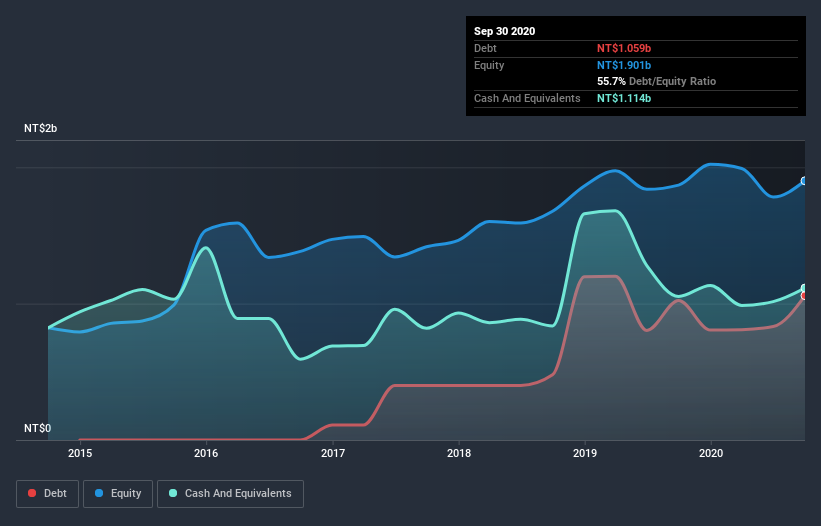David Iben put it well when he said, 'Volatility is not a risk we care about. What we care about is avoiding the permanent loss of capital.' It's only natural to consider a company's balance sheet when you examine how risky it is, since debt is often involved when a business collapses. As with many other companies Jourdeness Group Limited (TPE:4190) makes use of debt. But is this debt a concern to shareholders?
Why Does Debt Bring Risk?
Generally speaking, debt only becomes a real problem when a company can't easily pay it off, either by raising capital or with its own cash flow. In the worst case scenario, a company can go bankrupt if it cannot pay its creditors. However, a more frequent (but still costly) occurrence is where a company must issue shares at bargain-basement prices, permanently diluting shareholders, just to shore up its balance sheet. Having said that, the most common situation is where a company manages its debt reasonably well - and to its own advantage. When we examine debt levels, we first consider both cash and debt levels, together.
Check out our latest analysis for Jourdeness Group
What Is Jourdeness Group's Net Debt?
The chart below, which you can click on for greater detail, shows that Jourdeness Group had NT$1.06b in debt in September 2020; about the same as the year before. However, it does have NT$1.11b in cash offsetting this, leading to net cash of NT$55.3m.

How Strong Is Jourdeness Group's Balance Sheet?
The latest balance sheet data shows that Jourdeness Group had liabilities of NT$3.38b due within a year, and liabilities of NT$1.32b falling due after that. On the other hand, it had cash of NT$1.11b and NT$183.5m worth of receivables due within a year. So its liabilities outweigh the sum of its cash and (near-term) receivables by NT$3.40b.
This is a mountain of leverage relative to its market capitalization of NT$5.47b. This suggests shareholders would be heavily diluted if the company needed to shore up its balance sheet in a hurry. Despite its noteworthy liabilities, Jourdeness Group boasts net cash, so it's fair to say it does not have a heavy debt load!
The modesty of its debt load may become crucial for Jourdeness Group if management cannot prevent a repeat of the 29% cut to EBIT over the last year. When a company sees its earnings tank, it can sometimes find its relationships with its lenders turn sour. When analysing debt levels, the balance sheet is the obvious place to start. But ultimately the future profitability of the business will decide if Jourdeness Group can strengthen its balance sheet over time. So if you're focused on the future you can check out this free report showing analyst profit forecasts.
Finally, while the tax-man may adore accounting profits, lenders only accept cold hard cash. While Jourdeness Group has net cash on its balance sheet, it's still worth taking a look at its ability to convert earnings before interest and tax (EBIT) to free cash flow, to help us understand how quickly it is building (or eroding) that cash balance. During the last three years, Jourdeness Group generated free cash flow amounting to a very robust 83% of its EBIT, more than we'd expect. That positions it well to pay down debt if desirable to do so.
Summing up
Although Jourdeness Group's balance sheet isn't particularly strong, due to the total liabilities, it is clearly positive to see that it has net cash of NT$55.3m. The cherry on top was that in converted 83% of that EBIT to free cash flow, bringing in NT$575m. So we don't have any problem with Jourdeness Group's use of debt. There's no doubt that we learn most about debt from the balance sheet. However, not all investment risk resides within the balance sheet - far from it. We've identified 2 warning signs with Jourdeness Group , and understanding them should be part of your investment process.
At the end of the day, it's often better to focus on companies that are free from net debt. You can access our special list of such companies (all with a track record of profit growth). It's free.
When trading Jourdeness Group or any other investment, use the platform considered by many to be the Professional's Gateway to the Worlds Market, Interactive Brokers. You get the lowest-cost* trading on stocks, options, futures, forex, bonds and funds worldwide from a single integrated account. Promoted
New: Manage All Your Stock Portfolios in One Place
We've created the ultimate portfolio companion for stock investors, and it's free.
• Connect an unlimited number of Portfolios and see your total in one currency
• Be alerted to new Warning Signs or Risks via email or mobile
• Track the Fair Value of your stocks
This article by Simply Wall St is general in nature. It does not constitute a recommendation to buy or sell any stock, and does not take account of your objectives, or your financial situation. We aim to bring you long-term focused analysis driven by fundamental data. Note that our analysis may not factor in the latest price-sensitive company announcements or qualitative material. Simply Wall St has no position in any stocks mentioned.
*Interactive Brokers Rated Lowest Cost Broker by StockBrokers.com Annual Online Review 2020
Have feedback on this article? Concerned about the content? Get in touch with us directly. Alternatively, email editorial-team (at) simplywallst.com.
About TWSE:4190
Jourdeness Group
Manufactures and sells cosmetics in China, Taiwan, and internationally.
Low risk and slightly overvalued.
Similar Companies
Market Insights
Community Narratives



